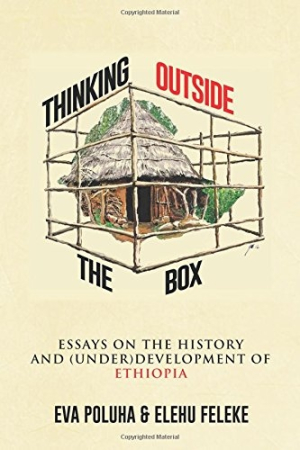Thinking Outside the Box
Essays on the History and (Under)development of Ethiopia
The authors issue a resounding call for a new way of thinking that will make it possible for nations such as Ethiopia to take their places among the developed nations of the world.
Thinking Outside the Box: Essays on the History and (Under)Development of Ethiopia, by Eva Poluha and Elehu Feleke, is a thoughtful, well-researched, and compelling attempt to make sense of why Ethiopia, even with its long, rich history, remains one of the poorest nations in the world. The book hopes to encourage the “out-of-the-box” thinking that is key to a clear and accurate picture of the nation’s past, present, and potential future.
Many think of Ethiopia, a nation with a two-thousand-year history and an estimated population of ninety-nine million, as a land of mass starvation and armed conflict; for others, scenes of its Olympic gold medal-winning long-distance runners come to mind. But few are aware that Ethiopia’s economy is among the fastest-growing in all of Africa and that, despite its many contrasts (topographical, climatological, historical, cultural, economic, and linguistic), it boasts “a strong, historically evolved cohesion” among its people. Thinking Outside the Box traces how the area known as the “cradle of civilization” developed, from the historic roots of the modern Ethiopian state to the current conditions of the land and its people.
The book brings Ethiopia’s extreme material poverty and technological backwardness to light, looks at issues of development and underdevelopment from a global perspective, and explores what might be needed for the nation to “catch up.” Based on extensive research and thoroughly annotated with explanatory footnotes, it captures and holds attention with intriguing, little-known facts about the nation, including that Ethiopia has its own completely indigenous script and system of reckoning time; that at least eighty languages are spoken by its people; that it boasts a two-thousand-year-old agricultural history and “distinctive and diversified food cultures”; and that, until very recently, over 90 percent of its population was illiterate, with many children still unable to complete primary school.
The “Who Are We” section included at the beginning of the book is a friendly introduction to the authors that would be enhanced by a photo of each. The inclusion of a list of maps and tables facilitates locating specific information quickly. Although terms used in the book are most often clear and easy to understand, “Monophysite Christianity” should be explained when it is first introduced. Spelling and punctuation errors are frequent, with occasional errors in syntax, subject-verb agreement, and word usage present as well.
Perhaps Poluha and Feleke’s most important contribution lies in their calling attention to the fact that, due to Western European “superiority” having been for so long taken for granted, making any accurate assessment of Ethiopia, its people, and its role in the world is extremely difficult, if not impossible.
Holding the West accountable for the systematic “plunder of the labor and resources of every conceivable corner of the world” that made its “superiority” inevitable, they issue a resounding call for a new way of thinking, new questions, and the new answers that will make it possible for nations such as Ethiopia to take their places among the developed nations of the world.
Reviewed by
Kristine Morris
Disclosure: This article is not an endorsement, but a review. The publisher of this book provided free copies of the book and paid a small fee to have their book reviewed by a professional reviewer. Foreword Reviews and Clarion Reviews make no guarantee that the publisher will receive a positive review. Foreword Magazine, Inc. is disclosing this in accordance with the Federal Trade Commission’s 16 CFR, Part 255.

